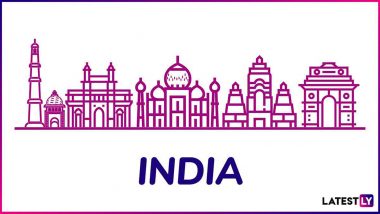New Delhi, Jan 18 (PTI) The Supreme Court on Tuesday asked the Centre to prepare a model to implement the Community Kitchen scheme across the country and for providing additional food grains to states to run it, saying that presently the issue of "hunger has to be taken care of".
A bench headed by Chief Justice N V Ramana, during the hearing, took a strong note of the submissions of Attorney General K K Venugopal that no state has reported starvation death by saying, "Are you making a statement that there are no starvation deaths in the country now."
Also Read | COVID-19 Vaccine for Children: Ensure Only Covaxin Is Given to 15-18 Group, Says Bharat Biotech.
The law officer told the bench, also comprising justices A S Bopanna and Hima Kohli, that no such information has been given by the states and the fact about malnutrition cannot be denied.
The bench said that besides framing the scheme, the Centre will file an affidavit on providing extra food grains to states which have been given liberty to file affidavits on issues of "malnutrition, starvation deaths".
While adjourning the hearing in the case by three weeks, it agreed with the submission of the Centre that the logistical issues, for implementation of the community kitchen scheme, will have to be taken care of by state governments.
"The Attorney General has explained the stand of the Government of India by placing on the additional affidavit dated ... we explained the Attorney General about the intention of the court particularly about the preparation of the model scheme and possibility of exploring the resources ...
“So far as the logistics are concerned it has rightly been pointed out by the AG that it has to be done by the state governments...In view of that, we adjourn the case for a period of three weeks,” the bench said in the order.
"You are not taking the issue seriously. That is why we imposed the cost, we are waiving off the cost, but you must stick to the schedule given," it said while waiving off the fine imposed on states for not filing their responses in the case.
The bench was hearing a PIL seeking directions to the Centre, states and Union Territories (UTs) to formulate a scheme for community kitchens to combat hunger and malnutrition.
At the outset, the bench was irked over the submissions made in the Centre's affidavit that the courts should not enter into the arena of policy domain.
“We are not on the bigger issues of starvation and malnutrition...hunger has to be taken care of to be satisfied and the poor people who are on the street and who are suffering because of that. States are not denying that there are no such issues. Everybody is admitting that there is an issue...You (Centre) ask your officers to apply their mind and formulate a model scheme,” the bench said.
Majority of states are willing to run a scheme provided the Centre provides some guidelines and funds, it said.
“We will proceed on the basis that community kitchens are necessary and so far as the malnutrition is concerned, it exists and therefore irrespective of whether there is any death or not, the scheme will be framed,” the law officer said, adding that the Central government cannot provide funds by cutting it from other existing welfare schemes.
The bench said that the logistics are not an issue because this is a popular scheme and “popularity-wise” every government will want to run this.
“I don't want to comment because this is election time ...the governments are giving so many other welfare schemes. They can give something to survive,” the CJI said.
Referring to affidavits of some states, the bench said some of them are already implementing community kitchens and asking for funds, some others have not started but are ready to if they get central funds.
Earlier, the bench had expressed strong displeasure over the Centre's response on framing the policy on Community Kitchen Scheme.
"This affidavit does not indicate anywhere that you are considering framing a scheme. You are extracting information. It does not say what fund you have collected and what you are doing etc. We wanted a uniform model from the Centre. You have to ask the states... Not to collect information like police,” the bench had said.
Advocate Ashima Mandla, appearing for the PIL petitioner, had said 69 per cent of children under the age of five have lost their lives due to malnutrition and it is high time that states take steps to set up community kitchens. The apex court had on October 18, 2019, favoured setting up of community kitchens, saying the country needs this kind of a system to tackle the problem of hunger.
It had issued notices to the Centre and all states asking for their responses on a PIL seeking directions to all the states and UTs to formulate the community kitchens.
The plea claimed that many children under the age of five die every day due to hunger and malnutrition and this condition was violative of various fundamental rights, including the right to food and the life of citizens.
The PIL, filed by social activists Anun Dhawan, Ishann Dhawan, and Kunjana Singh, had also sought a direction to the Centre for creating a national food grid for people falling outside the purview of the public distribution scheme.
It had also sought the issuance of an order to the National Legal Services Authority (NLSA) for formulating a scheme to mitigate hunger-related deaths.
(The above story is verified and authored by Press Trust of India (PTI) staff. PTI, India’s premier news agency, employs more than 400 journalists and 500 stringers to cover almost every district and small town in India.. The views appearing in the above post do not reflect the opinions of LatestLY)













 Quickly
Quickly


